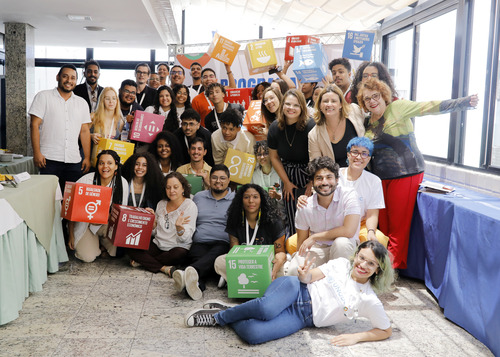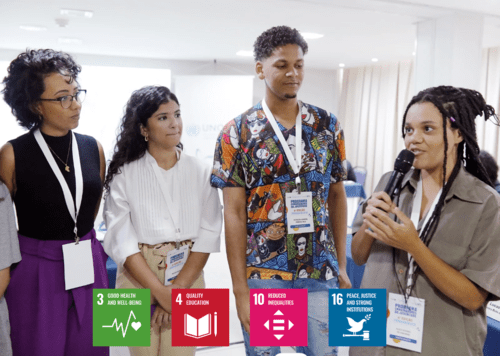Empowering Youth Ambassadors Driving Sustainable Change in Brazil
Pictures: UNODC
Pernambuco, Brazil: Out of Brazil's total population of 203 million, around 45 million are young people (15 to 29 years old), according to the last census in 2022. Brazilian youth face a complex reality: high homicide rates, gang activity and poverty, which can put young people at risk of being victims or perpetrators of violence, limiting their opportunities for education, employment, and a safe future. Particularly, in the State of Pernambuco, young people face significant challenges emanating from crime, violence and drug abuse, resulting in some of Brazil's highest violent death rates. Limited prospects in education and employment fuel a cycle where access to drugs and firearms contributes to violent deaths, further entrenching young men and women in a cycle of hardship.
To address the challenges Brazilian youth face, in 2016, UNODC, in partnership with CNP Brazil Institute, launched the Youth Ambassadors Programme, an initiative aimed at empowering young leaders and building their resilience against violence and crime by strengthening their personal, inter-relational and professional skills and fostering their engagement in inclusive and meaningful debates. Since 2017, building their capacity to champion the Sustainable Development Goals (SDGs) in their communities has become the main focus of the programme.
The 6th edition of the Youth Ambassadors Programme successfully concluded in September 2023 with 25 new young ambassadors from the State of Pernambuco empowered to advocate for violence prevention policies and strategies at the local, national, and global levels. The project included a series of activities organized into thematic modules addressing the fundamental pillars of the SDGs. These modules were structured into four main categories: Planet, People, Prosperity, and Peace, aiming to provide a comprehensive and in-depth understanding of challenges and opportunities related to sustainable development.
“The training provided a comprehensive overview of social, political, and economic issues, empowering me to lead effectively and develop innovative strategies to promote inclusion and equality,” said Luana Maria, a participant in the 6th edition of the Youth Ambassadors Programme and founder of Pajubá Tech, an initiative promoting gender diversity in the tech and innovation sector. Today, using the skills she acquired in the training, Luana is developing initiatives that positively impact the lives of LGBTQIA+ youth in her community.
Aryane Parra, leadership training supervisor at the NGO Politize! and Youth Ambassador of the State of Pernambuco, highlighted that after completing the training, she felt more empowered to assume leadership roles. “My biggest takeaway was developing the skillset to network effectively, build meaningful connections, and translate discussions into actionable strategies,” Aryane added.

The initiative is also an inclusive dialogue platform that brings together individuals from diverse backgrounds- social, economic, academic, religious, ethnic, sexual orientation and gender identities. This includes young people with disabilities, refugees, members of indigenous communities and persons from Brazil's Quilombola communities (descendants of enslaved black people who managed to escape and establish living spaces called Quilombos, where they continue to preserve their cultural traditions in the African diaspora).
“The exchange and dialogue created collectively with other young people were fundamental. Despite their different experiences and backgrounds, it was possible to achieve a beautiful exchange of actions, strengthening us as a group and empowering us to enhance our performances”, explained Cláudio Valente, a young advocate for local educational initiatives such as the Paulo Freire Compaz and a participant in the 6th edition of the Youth Ambassadors Programme.
Six successful editions and 150 certified Youth Ambassadors later, a vibrant network of empowered young activists has emerged. Equipped with a vast set of skills and a solid understanding of peace and justice, gender equality, poverty eradication, entrepreneurship, health and environmental issues, these changemakers are now even more effective SDG advocates at the local, national, and international fronts.
The Youth Ambassadors Programme supports the achievement of several targets under SDG 3, SDG 4, SDG 6, SDG 8, SDG 10, SDG 11, SDG 13 and SDG 16, especially SDG Target 3.5 on strengthening the prevention and treatment of substance abuse, including narcotic drug abuse and harmful use of alcohol; Target 4.7 on ensuring that all learners acquire the knowledge and skills needed to promote sustainable development; Target 10.2 on empowering and promoting the social, economic and political inclusion of all; as well as Target 16.1 on significantly reducing all forms of violence and related death rates everywhere.
Empowering and meaningfully engaging young people in the fight against drugs and crime remains at the core of UNODC's efforts around the world. Multi-language tools for ease of access and free dissemination are available here: https://www.unodc.org/unodc/es/youth/index.html.
For more information on UNODC's contribution to the SDGs, please click here: UNODC & The SDGs.
